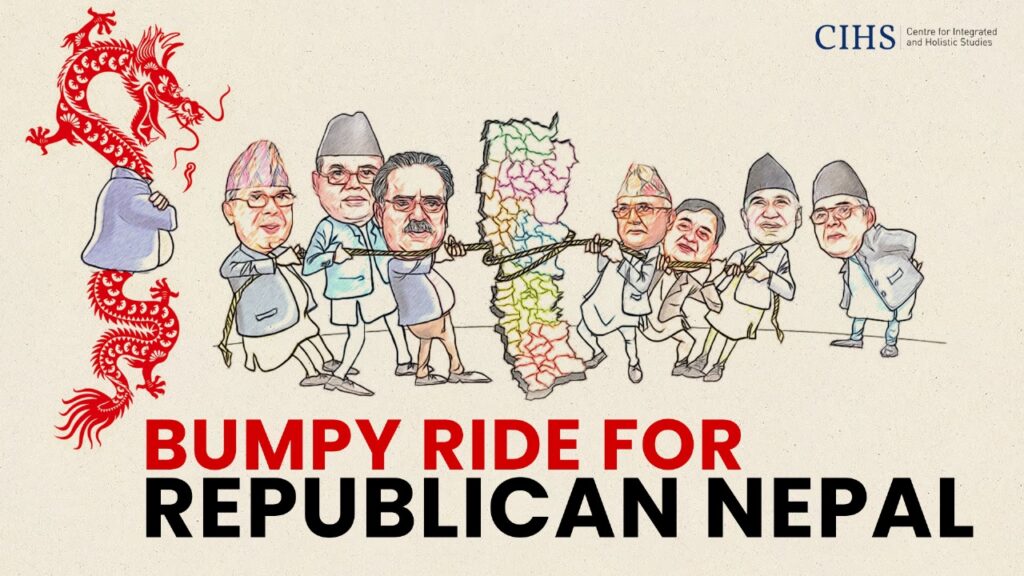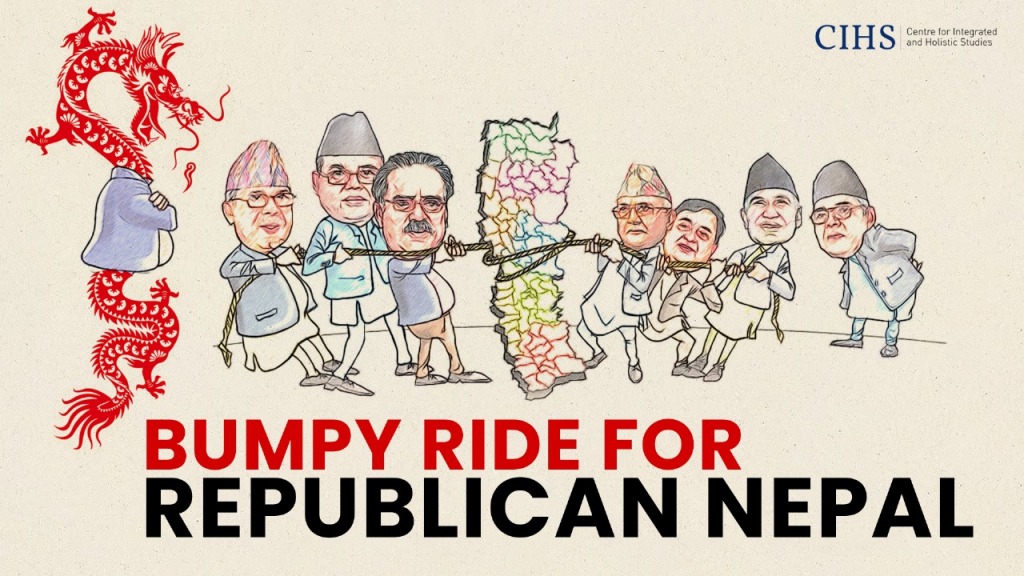
Bumpy ride for Republican Nepal
Political parties, old and new, will have to measure up to expectations of Nepalese people for socio-economic development, prosperity
Navita Srikant
General Elections of November 2022 in Nepal saw emergence of alternate political parties besides the mainstream traditional players. Traditional democratic forces and communist ideologies were challenged by young and professional voices who advocated change.

Terai Leaders continued their journey in fragments. The Elections also witnessed calls for return to Hindu Nation and Constitutional Monarchy as against the present multi-party system. “Raja aau Desh Bachau” (Oh King! Please come to save the country) was popular with youngsters. It has been eighteen months since 2022 elections and political uncertainty as well as chaos has become the new normal.
If there be one line to sum up the mood amongst citizenry, it would be the desire to seek change from prevailing status quo. Youth continue to be a frustrated lot given that the education is redundant and does not land them in jobs. Women struggle to make their voice heard and be represented in decision making within a regimental patriarchal society while businesses struggle to deal with liquidity crunch. They see little hope even in clearing public borrowings made during global pandemic Covid19. Entrepreneurship across Nepal is on the deathbed as there’s no supportive ecosystem.
Amidst this social and economic unrest in Nepalese society, one had hoped for political stability to address these lingering issues. But, the mainstream parties as well as new political formations could barely sustain the momentum of growth and development. Instead, they got pre-occupied with power sharing permutations and combinations. In the meanwhile, forex reserves swelled only due to increased remittances. But, increasing conflict and war situations around the world exposed vulnerability of remittances-based economies like Nepal and amplified the need for more stable policy frameworks.
On domestic front, Nepal was hit by high profile policy related corruption that seriously dented the image of political parties. Bhutanese Fake Refugee Scam of transnational nature incriminated high ranking politicians, former ministers and bureaucrats. Policy linked corruption in cases as Giri Bandhu Tea Estate, Lalita Niwas Land scam and Cooperative sector irregularities are classic cases of amending rules, regulations to enable non-state actors from taking advantage to benefit chosen private entities at the cost of the Exchequer.
Similarly, Maoist Cantonment scam is another case to use state coffers to pay the parties’ supporters. It wouldn’t be an exaggeration to state that the strongest and only nation state in South Asia that was never colonized is being plundered and looted by its own political leadership and more so under the new three-tier federal system. In the recently released, sixty first annual report of the Office of Auditor General of Nepal, it is stated that 171 local level units under Local Government have spent Nepali Rs 9.15 crores in salaries for appointment of personal secretaries and advisors for which there is no provision in provincial laws. Additionally, the report pointed out irregularities in procurement and implementation in projects managed by Nepali Police and Security Forces. Nepali Army’s name was embroiled in cases of procurement irregularities in Kathmandu Terai Fast Track Project (KTFT Project).
In a recent case, there was an uproar in arrest of Kailash Sirohiya, the chairman of Kantipur Media Group (KMG) over his citizenship credentials. In brief, the citizenship number allotted to Sirohiya was previously set aside to one Shivaji Sahu Teli. Sirohiya had obtained citizenship by descent in 1979 and renewed his citizenship card in 2000. The confusion with citizenship numbers and two persons being allotted the same number appears to be an issue of institutional capacity at local administrative units.
What was surprising that local authorities jumped the gun and arrived at his offices to arrest in broad daylight instead of serving show cause notice to Sirohiya for explanation and in parallel conducting their own review of files and archives? KMG is one of the leading Media Groups in Nepal. Recent news stories in KMG on irregularities and unlawful gains reportedly made through four cooperatives by Rabi Lamichhane, Deputy Prime Minister and Minister of Home Affairs may have served as immediate provocation to question Sirohiya’s citizenship.
Developments leading to arrest and thereafter national uproar, calls for solidarity with KMG’s Sirohiya and demands to end pressure tactics to prevent free press and freedom of expression hogged headlines. Leading opposition party, Nepali Congress including some of the leaders of the existing coalition condemned use of undue force and pressure by the Government for what seemed like a procedural inquiry and could have followed its due course without having to flex muscle. Coalition Government leaders remained mum to save the government from a free fall. Prime Minister Pushpa Kamal Dahal ‘Prachanda’ recently stood for his fourth ‘Vote of Confidence’ in just18 months, three times by swapping coalition partners and once due to break-up in Janata Socialist Party (JSP), the coalition partner in the third time government.
Rather than rainbow colours of sectoral development, growth plans and progress, Nepal’s canvas on domestic affairs reflect predominance in dark colors of coalition politics, corruption and vendetta politics, financial irregularities surpassing past numbers due to three-tier political administrative structure.
Investment Board of Nepal put in huge efforts to organise a high-level Nepal Investment Summit with over 800 foreign delegates and 2500 domestic leaders. The summit rightly created positive buzz and provided a platform for networking and collaborations. Summit participants were rather unanimous that ‘Emerging Nepal’ is ready for foreign investment.
But, one silently noticed that a shiver went down the halls of the Summit in desperate search for domestic political leadership with spine. It is now imperative that the shiver doesn’t end looking for a foreign spine with attractive offers and hidden caveats in between the lines that can end up ruining the economy.
Nepal is still sitting with exposure of Chinese defunct aircrafts (which were rejected by Bangladesh but bought by Nepal) and Pokhara Airport Loan. While Chinese leadership stated Pokhara Airport to be part of BRI Project, then Nepali Government clearly stated that it doesn’t fall under this classification.
In the meanwhile, China opened up to the world trade and movement of people post-Covid19 to its bordering partners much before with Nepal. On May 26, 2024, China opened seven border posts out of 14 for Nepal. To the contrary, India remained opened through the Covid19 by supporting Nepal with essentials trade, commerce and people movement except for the brief periods of global lockdown.
India’s opening of borders for Nepal during Covid19 was unparalleled in history of global health crisis and lockdowns. It is an unwritten and an unspoken jewel in bilateral relations that neither Indian media nor Nepali houses made an effort to research and write about. Perhaps, this is what real India-Nepal relations are all about. Nepal doesn’t boast of prioritizing its commitment towards security concerns of India in its overall foreign policy and India doesn’t show off the commitment towards uninterrupted supplies in peak of Covid19 and being the first responder in crisis. One must remain proud of the depth and trust in relations and the “Neighbourhood First” commitments towards each other.
Priorities for Nepal should therefore be political stability coupled with economic sustainability and entrepreneurship. Smart Education and Jobs for Youth, fast paced development with vision of 10 years including its foot on carbon trading platform, institutional capacities building of Public Service Delivery Offices and corruption control and good governance may have to be prioritized.
One needs to capitalize on visits of Indian business delegations, Heads of Judiciary, Comptroller Auditor General of India and Secretary General of Bimstec to strengthen potential collaborations for institutional capacities, e-Governance, connectivity, trade and commerce not just with India but beyond to the Bay of Bengal.
India is a natural, timeless and trusted partner to support Nepal’s ambition of economic growth and progress through cooperation and collaboration.
(Author is an International Development Expert in Financial Management, Forensic and Anti-Corruption.)

